6 creepy ways your bedroom can make you sick
Dust mites and lingering viruses are just two health hazards. Use these tips to make a clean sweep.
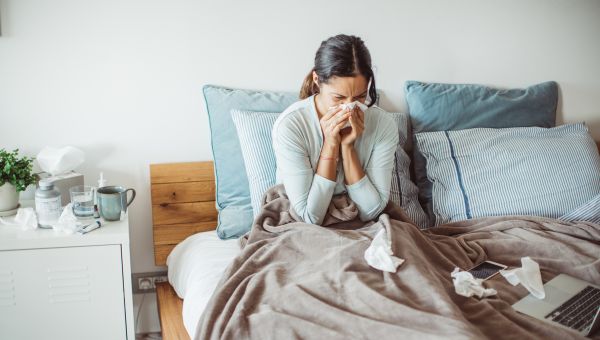
The average adult spends approximately 3,000 hours in their beds every year. But do you know whether or not your bedroom is “healthy?” Most people don’t.
“Your environment is very important for the quality of sleep you get,” says sleep center liaison, Barb Schulze, RRT, CSE, of Mercy Health Saint Mary’s Sleep Center in Grand Rapids, Michigan. Whether you see it or not, your pillow, sheets, mattress and other bedding, can create a perfect environment for dust mites, allergens and germs. Find out how they can make you sick—plus ways to give your bedroom a clean sweep.
Medically reviewed in January 2020.
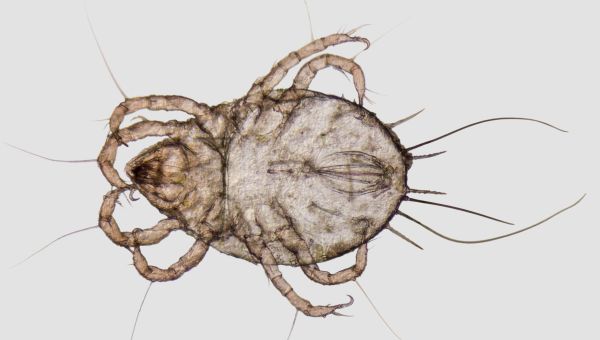
Dust mites
Dust mites are naturally occurring, microscopic bugs that feed off of our dead skin flakes. While they don’t bite, their remains and waste products are major allergy and asthma triggers affecting some 20 million Americans. Dust mites can be found anywhere, but in your bedroom they’re commonly found in mattresses, pillows, carpet, upholstered furniture and household dust.
Prevention is key. “Cover your mattress and pillows with protectors so dust mites don't get embedded and start living there,” says Schulze. She also recommends washing bed sheets weekly, keeping your bedroom cool since dust mites thrive in rooms 70 degrees or higher, and investing in a dehumidifier, since they love humidity levels of 75 to 80 percent. Vacuuming and dusting your bedroom at least once a week helps, too. Since you can’t wash a mattress, sprinkle it with baking soda once a year, let it sit for 20 minutes, then use a small hand-held vacuum to get rid of the baking soda—and dust mites.
If the dust mites in your home are really bothering you, your healthcare provider may suggest a new allergen extract to help. Randomized trials found that the FDA-approved medication may help improve nasal and eye allergy symptoms associated with dust mites in the home.
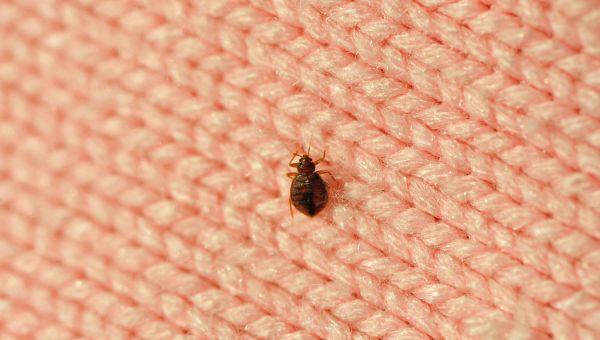
Bed bugs
These hard-to-detect parasitic, wingless insects subsist only on the blood of humans and pets and make their homes any place close to where people sleep. They can be found in upholstered furniture, bedding and mattresses, and are typically carried from place to place as people travel—they love to stowaway in luggage, overnight bags and folded clothing. Once they’ve settled into their new home, they squeeze their flat bodies into places like the seams of mattresses, headboards, the crevices of nightstands and any clutter around a bed waiting for their nightly meal—you—to go to sleep.
How do you know if you’ve been infested? “You can’t always see bed bugs in your bed, but you can get signs of them by little tiny bites on your body,” says Schulze. “Adult bed bugs are visible, especially if they’re engorged with blood. Then they’re about the size of an apple seed.” Another telltale sign is excrement, which looks like black dirt or mold, left behind. Bed bugs don’t spread diseases, but they can cause itching, excessive scratching and could result in an allergic reaction. To soothe the itching, apply an antiseptic cream.
According to the Centers for Disease Control and Prevention (CDC) the best way to rid of bed bugs is by spraying infected areas with an insecticide. In addition, wash bedding often and dry it in a hot dryer for at least 30 minutes to help kill bugs and eggs.

Pet dander
Snuggling up with your pet each night is great, but if you’re allergic to pet dander, that along with harmless substances in your pet’s urine or saliva could cause allergic reactions. Dander can be especially aggravating at night since it collects on bedding, upholstered furniture and carpets.
“You may be allergic if you notice respiratory problems such as nasal drainage and watery eyes. These problems can lead to poor quality sleep,” says Schulze. Symptoms of pet or dust allergies may even include severe breathing problems, shortness of breath or intense rashes on the upper part of the body. If allergies are severe, it could lead to an asthma attack.
“I recommend that patients shoo pets out of their bedroom and see if that changes the quality of their sleep,” says Schulze. If you have pets, whether they sleep on the bed or not, clean and vacuum your bedroom at least twice a week to reduce the amount of pet dander in the bedroom.
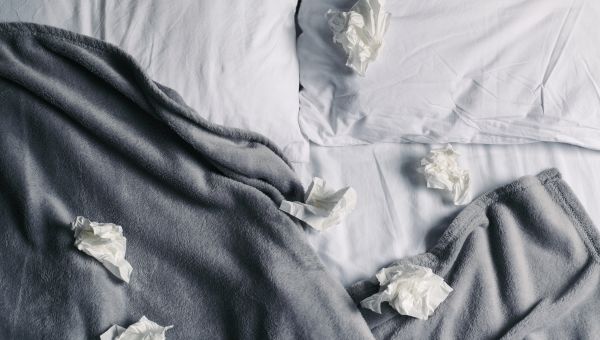
Cold and flu germs
You can’t see germs from last week’s cold hiding in your bed. But if you didn’t change your sheets after you started to feel better, you could be producing an environment for viruses to grow and infect someone else, says Schulze. The CDC says that even the flu virus can stay alive on some surfaces for up to 24 hours—but they can lose their infectiousness fairly quickly.
To avoid the problem—and prevent other family members who hop into your bed from getting infected, “wash your sheets in hot water because that will kill whatever you had brewing,” says Schulze. Tumble dry your linens on a hot setting, and use a bleach-based detergent to help sanitize your bed linens.
To give your bedroom an additional clean sweep, use household cleaners made for killing the influenza virus and disinfect surfaces such as doorknobs, light switches, TV remotes and phones.
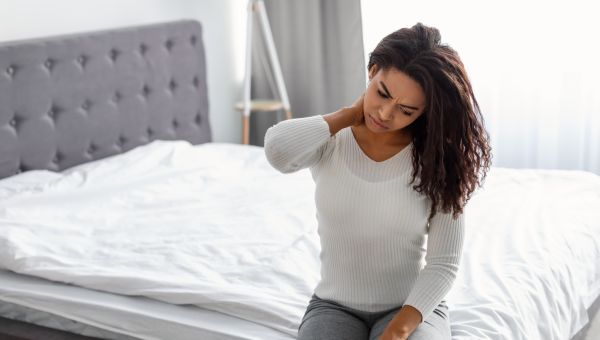
Wrong Mattress
Whether your mattress is long overdue for replacement or doesn’t provide the right kind of support, it can be a source of pain and poor quality sleep. A mattress that’s too soft can cause as many problems as one that’s too firm, resulting in low back pain, shoulder pain and stiffness. According to the National Sleep Foundation, the average lifespan of a mattress is eight years. In one study published in the Journal of Chiropractic Medicine researchers found that participants improved their sleep by replacing an old mattress that was on average 9.5 years old. Conventional wisdom also has it that a firm mattress is best, but researchers have found that medium-firm is the better choice for people with back pain. In one survey, people with low back pain who slept on a very firm mattress had the worst quality of sleep.
If you suffer from back pain, your mattress may not be the original source of it, but having a comfortable sleeping surface can help keep it from getting worse. Try testing out different mattresses to find the right support. “You spend a third of your life sleeping, so you want to make sure it’s not causing any pain,” says Schulze.
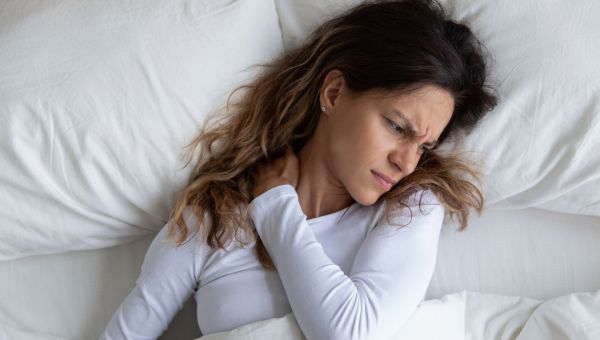
Problem Pillows
The wrong kind of pillow can literally give you a pain in the neck. The purpose of sleeping with a pillow is to keep your head aligned over your shoulders as if you were standing: your head shouldn’t jut forward or back, but support the natural curve of your neck. If you sleep on your back and the pillow is too high, you put yourself at risk for muscle strains in your neck and shoulders. If you’re a stomach sleeper, consider placing a small pillow under your pelvic area to keep your back properly aligned. Either skip using a pillow for your head, or use one that’s flat. If you sleep on your side, place a firm pillow between your knees; the pillow for your head should also keep your spine aligned.
The National Sleep Foundation suggests replacing older pillows every 18 months or so. Dead skin cells, dust mites and germs can collect in pillows, triggering allergy attacks. One way to extend the life of your pillow is to use a pillow protector. How do you know when it’s time to replace your pillows? Use the bounce test: Fold it in half. If it doesn’t spring back to shape, it’s time to give it a rest.
More On


video

article
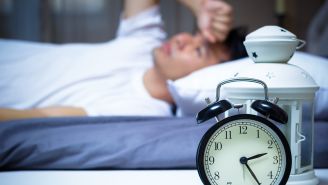
slideshow


video


video
